The following is an excerpt from a manuscript found in the papers of Dr. W. Carlton Smith of Salem, Oregon. Smith (1873-1930) served as a Commander of the 363rd Field Hospital Company, 316th Sanitary Train, 91st Division in WWI in France and Belgium. It is unclear if this was written by Smith or sent to him because of his connection to the Company. The presence of a handwritten manuscript suggests Dr. Smith may have been the author. WHC 0087.035.
When the good steamship Olympic left her moorings at pier 59, and her propellors
Little did the men of the 363rd Field Hospital Company realize the benefit that was to accrue to them from the desultory drills and maneuvers they had practiced at Camp Lewis. It was a far cry from the command “Fall in!” at six thirty oclock [sic] in the morning when they [sic] stood reveille in front of their barracks to caring for the wounded on the battlefields of France and Belgium, yet alertness to obey the order taught these men discipline. though they were trained for the Medical Corps, they were taught that there would be times when they must act with speed and military precision, hence they were given the usual Infantry drill for its disciplinary benefit. They were schooled in selecting the most desirable sites for a field hospital, and were
taught to erect the necessary tentage to care for sick and wounded on short notice. They could go into the open fields, and the various squads, working as a human machine, wagon loads of canvas and boxes, were soon converted into a large hospital with dispensary, operating rooms, kitchen, and wards sufficient for the accommodation of over two hundred patients. As youngsters, we have watched the efficiency of circus crews when they erected a tented city overnight; but these men could lay out their grounds with streets of regular width, and in less than one hour from the driving of the first tent pin, the operating room was fully prepared to receive patients, the kitchen was completely installed, ready to serve food, and beds in the wards were ready for the reception of patients. In less than half an hour this work could all be undone, and this mobile hospital could be struck, everything packed in its place and on the trucks ready for transportation to a new location…
No doubt when they were submitting to the iron hand of militaryrule [sic] in doing hours of company drill, taking long hikes about American Lake, sleeping on the ground in the snow on the banks of Murray Creek, or cooking their own bread and bacon over an individual fire made of fagots on the Nisqually reservation, they little saw what bearing this could have on their future career. Yet subsequent events showed that these inconveniences were only harbingers of some of the real hardships that were to follow. The men who had schooled themselves to obey military orders with quickness and precision, whether it be “Attention!” or “Eyes Right!” were the ones who first heard and interpreted the alarm “Gas!” and adjusted their masks quickly; or when airplanes of the enemy were overhead, did not hesitate, but obeyed almost automatically the alarm “Lights out!”
Fully equipped and in the pink of condition they “fell in” with full packs of the afternoon of June 27, 1918 to march to the awaiting train. History replete with the description of men saying their last good-byes, the last embrace, the gay uniforms, and the martial music of the bands as the train passed own the road around the curve and out of sight of the eager crowd; but these men, dressed in sombre khaki, with stern faces set to the East, showed no tremors. Good-byes were said quietly and without ostentation….
The trip across the continent was made without incident. Many for the first time had an opportunity to witness the magnificent scenery of the Columbia River gorge as the train sped eastward on its course. Next the panorama disclosed the fertile irrigated regions beyond the Blue Mountains, after which the Rockies with all their scenic grandeur occupied their attention. Gliding down the eastern slope of this great range, the train was soon speeding through the rich grain fields of the Mississippi valley, thence through the smaller but even mor [sic] beautiful farms of the central states. Flags borne by the people all along the route were waved at the passing train, and the chorus of the men rang out in answer. Soon the more populous centres of the far east were reached and the children would run toward the train with cries of “Kill the Kaiser!”, which seemed to be the unanimous verdict of the young American. On the sixth day the Alleganies had been crossed, and the last day was spent following the graceful curves of the Delaware, and shortly thereafter, on July 3rd, the train reached its destination, Camp Merritt, New Jersey. Here the men underwent the usual inspections, were outfitted anew, and in the interim had a chance to visit the great American metropolis…
PART 3
The first real introduction to France was the view from the moving train between Cherbourg and Saint Nazaire. Passing through the old province of Maine, green meadows and fertile fields were in evidence on every hand. The small fields surrounded by a stone fence or a fringe of hedge were quite a contrast to the large grain fields of our Middle West; but the ground was highly cultivated, and though the acreage small, the crops were bountiful…
On the afternoon of the twenty-seventh of August, the Sanitary Train again took up their packs and at last started for the actual fighting area. Entraining at Saint Nazaire, the beautiful valley of the Loire was followed as far sa [sic] Tours, then a southeasterly course was taken, and the end of two days, a large American supply camp, Is-sur-Tille, was reached without notable incident. Here a delay of several hours was caused on account of the heavy traffic over the roads, and the congestion of the trains moving men and supplies to and from the battle front. This advanced supply depot, like the one at the base, showed the result of much recent activity, and for the first time large groups of enemy prisoners were to be seen in the great work of construction and handling freight. Our train, getting clearance late in the afternoon, we were soon on the way, and evening found the troop train at a little station on the headwaters of the Meuse River…



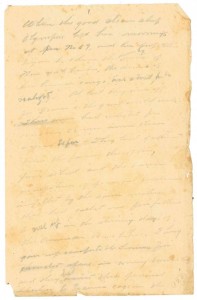
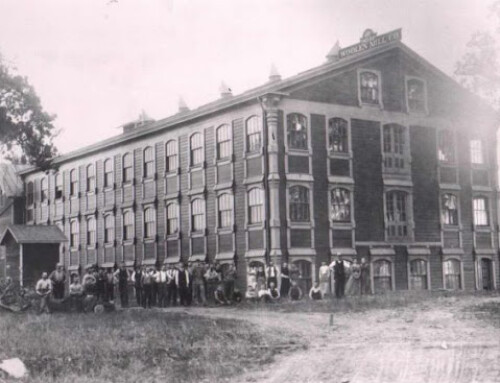
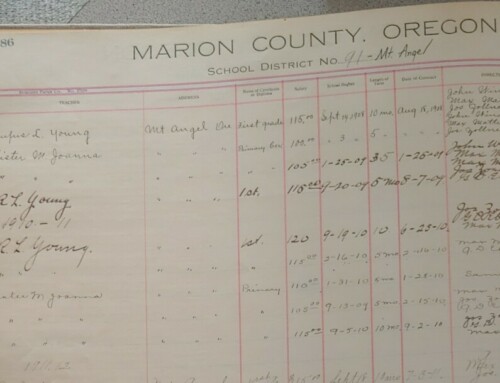
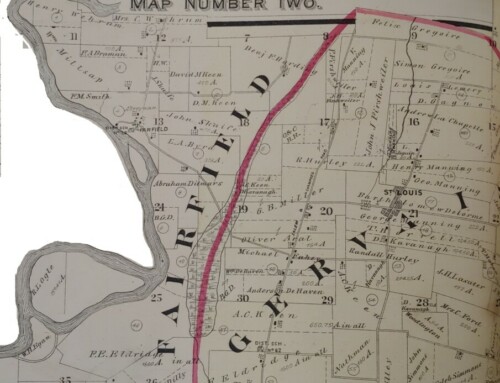
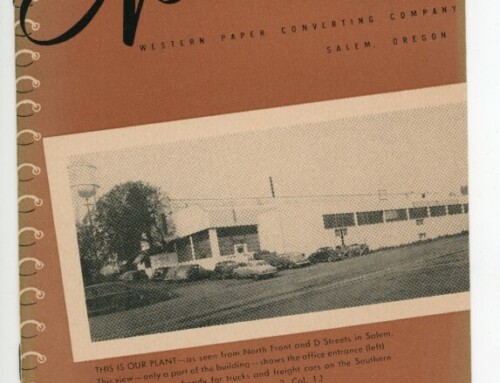
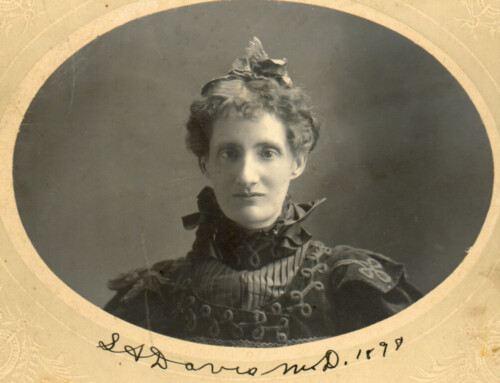
Wish I could read the rest. My great uncles served with the 363rd and I appreciate how this supplements their letters home.
The rest of the documents are in the museum holdings. You’d be more than welcome to come in and take a look at them. We are open Tuesdays – Fridays noon – 4 pm for drop in researchers, or by appointment. We hope to transcribe more at a future time!